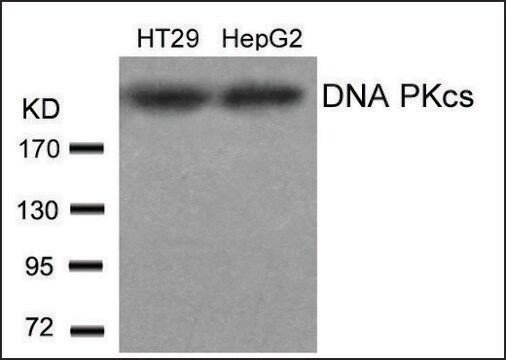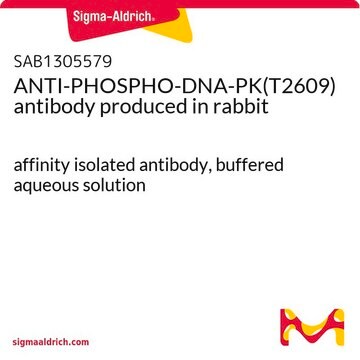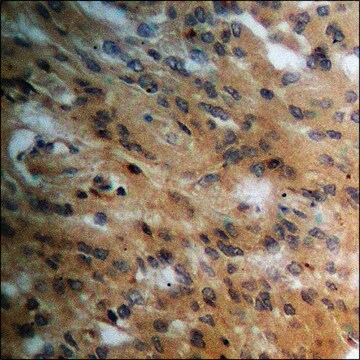SAB4300137
Anti-phospho-PRKDC (pThr2609) antibody produced in rabbit
affinity isolated antibody
Synonim(y):
Anti-DNA-PKcs antibody produced in rabbit, Anti-DNAPK antibody produced in rabbit, Anti-DNPK1 antibody produced in rabbit, Anti-HYRC antibody produced in rabbit, Anti-protein kinase, DNA-activated, catalytic polypeptide antibody produced in rabbit
About This Item
Polecane produkty
pochodzenie biologiczne
rabbit
białko sprzężone
unconjugated
forma przeciwciała
affinity isolated antibody
rodzaj przeciwciała
primary antibodies
klon
polyclonal
Postać
buffered aqueous solution
masa cząsteczkowa
~450 kDa
reaktywność gatunkowa
human
stężenie
1 mg/mL
metody
western blot: 1:500-1:1000
izotyp
IgG
sekwencja immunogenna
(V-E-TP-Q-A)
numer dostępu NCBI
numer dostępu UniProt
Warunki transportu
wet ice
temp. przechowywania
−20°C
docelowa modyfikacja potranslacyjna
phosphorylation (pThr2609)
informacje o genach
human ... PRKDC(5591)
Immunogen
Cechy i korzyści
Opis wartości docelowych
Postać fizyczna
Oświadczenie o zrzeczeniu się odpowiedzialności
Not finding the right product?
Try our Narzędzie selektora produktów.
Kod klasy składowania
10 - Combustible liquids
Klasa zagrożenia wodnego (WGK)
WGK 1
Temperatura zapłonu (°F)
Not applicable
Temperatura zapłonu (°C)
Not applicable
Certyfikaty analizy (CoA)
Poszukaj Certyfikaty analizy (CoA), wpisując numer partii/serii produktów. Numery serii i partii można znaleźć na etykiecie produktu po słowach „seria” lub „partia”.
Masz już ten produkt?
Dokumenty związane z niedawno zakupionymi produktami zostały zamieszczone w Bibliotece dokumentów.
Nasz zespół naukowców ma doświadczenie we wszystkich obszarach badań, w tym w naukach przyrodniczych, materiałoznawstwie, syntezie chemicznej, chromatografii, analityce i wielu innych dziedzinach.
Skontaktuj się z zespołem ds. pomocy technicznej








